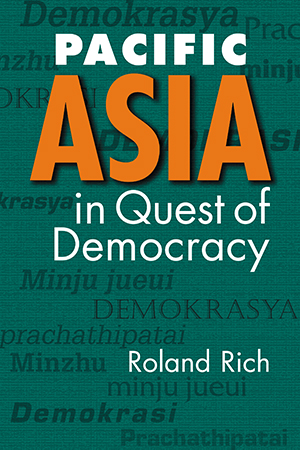What does democracy look like in Pacific Asia? Can democratic governance in the region survive the challenges of corruption, violence, and soft authoritarianism? What impact are economic pressures likely to have? These are among the broad questions tackled in
Pacific Asia in Quest of Democracy, a comparative study of democratic structures and practices in Indonesia, the Philippines, South Korea, Taiwan, and Thailand.
Roland Rich offers an original approach to a series of traditional topics: the institutions and legal underpinnings of democracy, the roles of political parties and politicians, the significance of a changing political culture. He also draws on his long experience living and working in the region to explore the public conversations taking place and the media that facilitates them.
His elegantly written work suggests that, although the countries of Pacific Asia lack a long democratic tradition, much more significant are the innovative democratic design and the enthusiasm for democratic participation exhibited there.
Roland Rich is executive director of the United Nations Democracy Fund. He previously served in the Australian Department of Foreign Affairs and Trade and in 1998-2005 was executive director of the Centre for Democratic Institutions at the Australian National University. His many publications include The UN Role in Promoting Democracy, Losing Control: Freedom of the Press in Asia, and Political Parties in the Pacific Islands.
"A combination of rich empirical data and insightful observation, it contributes to a variety of important theoretical debates about democratic development and tells a hopeful story of democracy in the region.... Raises a number of provocative questions for both scholars and practitioners."—Eric Chen-hua Yu, Taiwan Journal of Democracy
"The sheer diversity and unpredictability of democratic development in Asia provides ample scope for any democracy activist or scholar. In Roland Rich, one is fortunate to have both.... [A] rich combination of analysis, anecdote, and experience [is] reflected in this tome."—Satu P. Limaye, Journal of Democracy
"This is a truly impressive book—an incisive, wide-ranging, and up-to-date examination of the state of democracy in Asia. Rich's deep knowledge of the region, practical democracy-building experience, and lively prose come together masterfully into a definitive account."—Thomas Carothers, Carnegie Endowment for International Peace
"Roland Rich brings to this study a feel for the politics of Pacific Asia that is not only scholarly, but also personal, intuitive, and nuanced. His several decades of experience with the practice of diplomacy and democracy promotion helps him to transcend the rigid confines of ideologies and academic theories and to see Pacific Asia's democracies as they are—a not always flattering picture—but also as they are becoming, or struggling to become, higher-quality democracies."—Larry Diamond, Stanford University
"This comparative assessment of the democratic credentials and shortfalls of Asia's various governments is greatly enriched by insights and illustrations from the author's extensive diplomatic experience in the region.... It is a significant contribution to the emerging debate about the nature of post-authoritarian regimes."—Garry Rodan, Murdoch University








